Energy Mining in the 21st Century First Severo Ochoa Workshop on Energy Storage and Harvesting
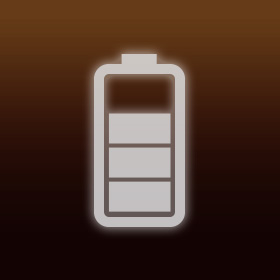 The “Energy Mining in the 21st Century” event is the first of two Severo Ochoa Workshops on Energy Storage and Harvesting, organized by the ICN2 within the framework of the 2019-2022 Excelencia Severo Ochoa Programme. This exclusive gathering aims at facilitating the dialogue and the establishment of new international collaborations between research groups working on clean energy technologies based on nanomaterial and nanodevices.
The “Energy Mining in the 21st Century” event is the first of two Severo Ochoa Workshops on Energy Storage and Harvesting, organized by the ICN2 within the framework of the 2019-2022 Excelencia Severo Ochoa Programme. This exclusive gathering aims at facilitating the dialogue and the establishment of new international collaborations between research groups working on clean energy technologies based on nanomaterial and nanodevices.
When: Friday 12 July 2019
Where: Mirador Room at the Centre de Cultura Contemporània de Barcelona (CCCB)
How to get there: https://goo.gl/maps/VDHExJp44GwLJXKK8
The event is fully booked.
For information or questions, please contact This email address is being protected from spambots. You need JavaScript enabled to view it..
The topics covered in this multidisciplinary event will include the latest advances in:
- Harvesting: In our everyday life, we are surrounded by various sources of clean and sustainable energy from ambient vibration and body movement all the way to the Sun. This energy normally goes wasted since we are not able to harvest it. In the last decades, an increasing effort has been put in developing technologies to take advantage of these sources and nanotechnologies are currently being explored for these applications.
- Storage: A roadblock to an extended employment of energy harvesting technologies is the difficulty of storing such energy. In most cases, it has to be spent at the same time as it is generated. Thus, energy storage methodologies need be engineered to separate the usage phase from the production one.
- Triboelectrics and other innovative approaches. What are the possible game changers in energy production? On the other hand, integrating energy harvesting and its storing (harvestorage?) in the same device is another crucial challenge for the sake of compactness and portability.
The topics that will be covered and discussed include photovoltaic and thermoelectric technologies, supercapacitors, piezo- and triboelectric nanogenerators.
Thanks to the participation of recognized researchers from various European institutes and the ICN2, the discussion will offer an updated overview of the energy harvesting and storage challenges. Representatives of selected local companies operating in the field will also take part in the event to contribute the industrial point of view in vision of future technology transfer collaborations.

Dr Teresa Andreu
Researcher at Catalonia Institute for Energy Research (IREC)
Lecturer at the Dept. of Materials Science of the Polytechnic University of Catalonia (UPC)
Teresa Andreu received her degree in Chemistry in 1999 and her PhD in Material Science in 2004 at the University of Barcelona (Spain), specializing in metal coatings, electrochemistry and corrosion. From 2004 to 2006, she has worked in the R&D Department of MacDermid Inc. In 2007, she joined the Department of Electronics at the Barcelona University, where she mainly focused on the synthesis of metal oxides using nanotemplates for gas sensors. In October 2009, she obtained a postdoctoral research grant (Beatriu de Pinós grant, from the Generalitat de Catalunya) and she joined as a researcher the Energy Storage and Energy Harvesting group of the Advanced Materials for Energy Research Department at the Catalonia Institute for Energy Research (IREC), being the deputy head of the group since 2016. Her current line of research is centered on next generation technologies for energy storage, CO2 recycling and low-C economy, such as photoelectrochemical CO2 reduction and water splitting, CO2 hydrogenation (thermal or plasma activation) and redox flow batteries. Her work aims at contributing from a material point of view to the development of future technologies by incorporating the flexibility required for sustainable energy storage. She is currently principal investigator of the WINCOST Spanish national project on chalcogenide based photocathodes for energy storage applications, of the Heat-to-Fuel H2020 project, a Ris3CAT COSIN project named “Synthetic fuels” led by Gas Natural Fenosa and other industrial projects. She is author of more than 90 scientific articles and 4 patent applications and she is currently lecturer at the Dept. of Materials Science of the Polytechnic University of Catalonia (UPC).
Abstract: Nanocatalysts to turn carbon dioxide and water to carbon-neutral synthetic fuels
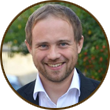
Dr Christophe Aucher
Energy Storage Team Leader, LEITAT R&D Department
Christophe Aucher holds a doctorate in Energy and Material Sciences from the University of Québec at Montréal (Canada, UQAM) and the Material Institute of Nantes (France, IMN). His research has been principally focused on the study and improvement of energy storage devices as lead-acid batteries and supercapacitors. His post doctoral position at IMN was focused onto the development of flexible energy storage devices from supercap and Li-ion technologies. Since 2011, he is developing his career in the LEITAT R&D department. LEITAT is a private Technological Centre based in Barcelona and dedicated to R&D activities in the areas of biomedicine, biotechnologies, environment, surface treatments, material science, nanotechnology and energies with deep knowledge and experience in technological transfers to several industrial sectors. Aucher is leading the Energy Storage Team from the Energy & Engineering Business Unit, where post lithium ion technologies and 3D micro-printed devices are developed. The Energies Storage Team from LEITAT is currently involved in National and European initiatives for electrical mobility, stationary and wearable electronics.
Abstract: Critical raw material free battery technology for automotive and stationary applications

Dr Mariano Campoy-Quiles
Tenured scientist at Institute of Material Science of Barcelona (ICMAB-CSIC)
Mariano Campoy-Quiles is a material scientist whose research addresses one of the most critical problems facing humanity: the future supply of clean energy. Together with his team, which includes 12 researchers, he has put substantial research effort in two application areas: solar photovoltaic (light to electric) and thermoelectric (heat to electric) energy conversion. He was awarded a 2014 ERC Consolidator Grant for his project on combinatorial screening of organic energy materials. His research is already highly recognized internationally, as proven by the >5100 citations his 82 papers have received, including three papers in Nature Materials and a stream of significant papers in other excellent journals (Advanced Materials, Energy and Environmental Science and Advanced Functional Materials). He is also co-inventor in two patents, co-author in five dissemination papers, and has given more than 40 invited/plenary talks at international conferences. He is currently the Coordinator of the strategic Research Line on Energy of ICMAB as well as a member of ICMAB´s Scientific Executive Board. Since April 2019, he is the coordinator of the Materials for Energy subline of the Agencia Estatal de Investigación.
Abstract: From colour-on-demand organic solar cells to solar thermoelectrics

Prof. Anders Hagfeldt
Professor of Physical Chemistry at the Laboratory of Photomolecular Science, Swiss Federal Institute of Technology Lausanne (EPFL)
Anders Hagfeldt is Professor of Physical Chemistry at EPFL, Switzerland. He obtained his Ph.D. at the Uppsala University in 1993 and was a post-doc with Prof. Michael Grätzel (1993-1994) at EPFL, Switzerland. His research focuses on dye-sensitized solar cells, perovskite solar cells and solar fuels. He has published more than 500 scientific papers that have received over 58,000 citations (data from Web of Science, May 2019). He was ranked number 46 on a list of the top 100 material scientists of the past decade by Times Higher Education. In 2014-2018 he was on the list of Thomson Reuter’s Highly Cited Researchers. He is a member of the European Academy of Sciences, Royal Swedish Academy of Sciences, Stockholm, Royal Society of Sciences in Uppsala, and the Royal Swedish Academy of Engineering Sciences in Stockholm. He is Doctor Honoris Causa at Université Paris Diderot, France.

Dr Sohini Kar-Narayan
Associate Professor of Device & Energy Materials in the Department of Materials Science, University of Cambridge
Dr Sohini Kar-Narayan is Associate Professor of Device & Energy Materials in the Department of Materials Science, University of Cambridge. She leads the interdisciplinary Nanogenerators & Sensors research group, working on functional nanomaterials and devices for energy, sensing and biomedical applications. She obtained her PhD in Physics from the Indian Institute of Science in 2009, following which she took up a postdoctoral position in Cambridge. She was subsequently awarded a Royal Society Dorothy Hodgkin Fellowship in 2012, and a World Economic Forum Young Scientist award in 2015. Her research interests include functional nanomaterials for energy applications, particularly on piezoelectric, ferroelectric, triboelectric and thermoelectric materials and devices for energy harvesting and sensing applications.
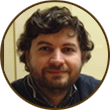
Dr Joan Ventura
Senior Researcher at the Institute of Physics of Materials of the University of Porto (IFIMUP)
Joan Ventura is a Senior Researcher at the Institute of Physics of Materials of the University of Porto (IFIMUP) and an Invited Professor at the Physics and Astronomy Department of the same university. Since 2012, he is the Vice-President of IFIMUP and of the Micro- and Nano-Fabrication Unit of the University of Porto (CEMUP-MNTEC). He published 6 book chapters, over 160 papers in peer review journals (including Nat. Nanotech., Nano Energy, Phys. Rev. Lett., J. Mater. Chem.) with over 1800 citations. His work was also recently granted awards from the European Space Agency (BIC award) and Repsol (RedEmprendia Solutions Repsol award).
Abstract: Triboelectric nanogenerators: from fundamental concepts to applications in harsh environments

María Escudero Escribano
Assistant Professor at the Department of Chemistry and the Nano-Science Centre, University of Copenhagen
María Escudero-Escribano graduated in Chemical Engineering from the University of Extremadura in 2016 and obtained her PhD in Chemistry from the Autonomous University of Madrid in 2011, with her PhD Thesis on electrocatalysis and surface nanostructuring. She carried out postdoctoral research at the Technical University of Denmark (2012-2015) and Stanford University (2015-2017). Since March 2017, she is Assistant Professor at the Department of Chemistry and the Nano-Science Center at the University of Copenhagen. She leads the NanoElectrocatalysis group, currently formed by 10 researchers (three postdoctoral fellows, three PhD students and four undergraduate students). In 2018, María was awarded a prestigious “Villum Young Investigator” grant from the Villum Foundation. Her group investigates tailored electrochemical interfaces for renewable energy conversion and electrosynthesis of sustainable fuels and chemicals.
María’s significant contributions to the fields of electrochemistry and catalysis have resulted in more than 30 publications in peer-review journals, including Science, Nature Chemistry, Nature Materials, JACS and Angewandte Chemie. Moreover, she is co-inventor of three patents. She is Chair of the Danish Electrochemical Society since 2018. María has received numerous awards in recognition of her early career achievements, including the European Young Chemist Award 2016 (Gold Medal) from EuChemS, the CIDETEC Young Researcher Award 2016 from the Electrochemistry Group of the Spanish Royal Society of Chemistry (RSEQ), the Electrochemical Society Energy Technology Division Young Investigator Award 2018, the Princess of Girona Scientific Research Award 2018, the Clara Immerwahr Award 2019 and the RSEQ Young Researcher Award 2019.
Abstract: Electrocatalysis for renewable energy conversion and production of sustainable fuels and chemicals
The Centre de Cultura Contemporània de Barcelona (CCCB) is a space for creation, research, exhibition and debate on contemporary culture where visual arts, literature, philosophy, film, music, transmedia activity and the performing arts are interconnected in an interdisciplinary programme. Located in the centre of Barcelona, it offers a perfect location for the event both physically and conceptually.
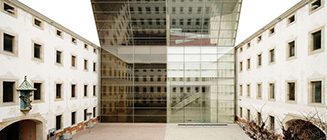 The Mirador occupies the fifth floor of the CCCB. Through the glass façade, visitors can contemplate Barcelona from an unusual perspective: the sea, the Barri Gòtic, Ciutat Vella, Montjuïc, Tibidabo and the tower at Collserola.
The Mirador occupies the fifth floor of the CCCB. Through the glass façade, visitors can contemplate Barcelona from an unusual perspective: the sea, the Barri Gòtic, Ciutat Vella, Montjuïc, Tibidabo and the tower at Collserola.
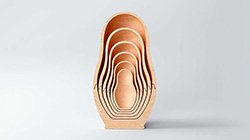 An exceptional exhibit about Quantum Physics is the main project displayed at the CCCB during the celebration of the event. The ICN2 is among the collaborating institutions curating content and participating in the outreach activities organized around this engaging proposal. Do not hesitate to take the opportunity to visit it during your stay in Barcelona.
An exceptional exhibit about Quantum Physics is the main project displayed at the CCCB during the celebration of the event. The ICN2 is among the collaborating institutions curating content and participating in the outreach activities organized around this engaging proposal. Do not hesitate to take the opportunity to visit it during your stay in Barcelona.

